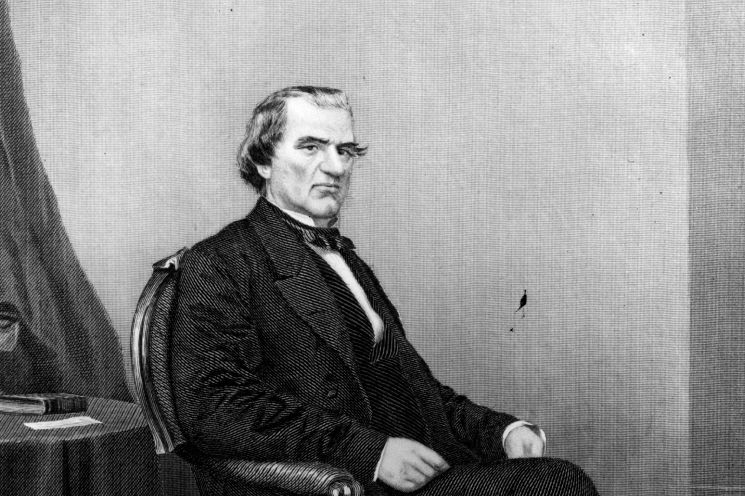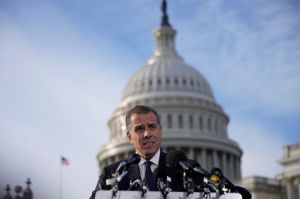The first time Congress impeached a president was in 1868. The president was Andrew Johnson, a man almost as surprising to find in the White House then as Trump is now. Johnson, a Tennessee Democrat with a taste for hard liquor, had been the only southern senator to stay loyal to the Union when the Confederate slave states broke away in 1861, provoking the Civil War. President Abraham Lincoln was a Republican but he ran for re-election in 1864 as a ‘Unionist’, and adopted Johnson as his running mate, hoping to pick up northern Democrats’ votes. The scheme worked and Lincoln won. Johnson was so drunk at his swearing-in as vice-president early in 1865 that his speech made no sense and he had to be led away by embarrassed friends. Nevertheless, when Lincoln was assassinated a few weeks later Johnson found himself in the top job.Republicans, who dominated both houses of Congress, were trying to transform the defeated South by giving the vote to freed slaves and preventing former Confederate leaders from getting back into power. Johnson’s view, by contrast, was that the defeated South should be re-assimilated as quickly as possible, with whites remaining in charge everywhere. He gave presidential pardons to many of the senior ex-Confederates. Republican sympathizers were furious. Conspiracy theorists — a perennial element of American political life — argued that Johnson had probably been part of the conspiracy to murder President Lincoln, but they never found convincing evidence.  Johnson, an aggressive white supremacist, spoke in favor of white rioters who had massacred black citizens in New Orleans and Memphis. He approved of the rising Ku Klux Klan, which originated in his home state of Tennessee. Denounced by the Republicans, he toured the country, making angry rambling speeches against them, comparing himself to Jesus and his critics to Judas Iscariot.Lincoln had appointed Republicans to the key jobs in his administration, including Edwin Stanton as secretary of war. Stanton, one of the masterminds of Union victory in the Civil War, was now supervising the pacification of the South under military rule. When Johnson tried to dismiss him, Congress passed a law, the Tenure of Office Act, to prevent it. Johnson fired him anyway. Stanton reacted to the news by barricading himself inside his office at the War Department and refusing to leave. Congress responded with impeachment. It had never happened before and they were not quite sure how to do it. The Constitution says that a president can be impeached for ‘high crimes and misdemeanors’, but what did that mean? As with Nixon, Clinton, and Trump, his enemies said he had committed high crimes and misdemeanors and his friends retorted that he had not. Johnson was indicted on 11 counts, one of which was that he had ‘attempted to bring into disgrace, ridicule, hatred, contempt, and reproach the Congress of the United States.’Johnson went on trial before the Senate in March 1868. The Senate today has a majority from Trump’s party, which has already declared its intention to exonerate him. In 1868, by contrast, Johnson’s antagonists were in the majority. After an acrimonious trial, supervised by the Chief Justice of the Supreme Court, the vote went against the president 35-19. Unfortunately for the prosecution, a two-thirds majority was needed to convict, and this vote fell one short. The crucial vote was that of Edmund Ross, a Kansas Republican. In the 1950s, John F. Kennedy wrote about Johnson’s impeachment in his book Profiles in Courage, depicting Ross as a hero for preventing the political chaos that would have followed a conviction. Later historians, unimpressed, have shown that Ross was almost certainly bribed for delivering the crucial ‘not guilty’ vote.Then, as now, a process that was meant to be judicial was in fact drenched in party politics from top to bottom. Several other Republicans in addition to Ross hesitated, because they knew that if Johnson was ousted, he would be replaced as president by Benjamin Wade, speaker of the House of Representatives. Wade’s views — which seem enlightened to us — were too much even for most of the Republicans; he was one of only a tiny minority in that era who favored genuine racial equality and votes for women. By the narrowest possible margin, therefore, Andrew Johnson escaped conviction. His political position was nevertheless hopeless. The Republicans were certainly not going to choose him as their candidate for that year’s election — they had war-hero Ulysses S. Grant waiting in the wings. Neither were the Democrats. As his term expired, he yielded the White House to Grant, who underlined his contempt for Johnson by refusing to ride with him in a shared carriage to the inauguration. Over the years, surveys of American historians on the question ‘who was the worst president in American history?’ have nearly always included Johnson in the bottom three. Recent versions of the survey also include the name of another president who now faces impeachment.Patrick Allitt is the Cahoon Family professor of American History at Emory University
Johnson, an aggressive white supremacist, spoke in favor of white rioters who had massacred black citizens in New Orleans and Memphis. He approved of the rising Ku Klux Klan, which originated in his home state of Tennessee. Denounced by the Republicans, he toured the country, making angry rambling speeches against them, comparing himself to Jesus and his critics to Judas Iscariot.Lincoln had appointed Republicans to the key jobs in his administration, including Edwin Stanton as secretary of war. Stanton, one of the masterminds of Union victory in the Civil War, was now supervising the pacification of the South under military rule. When Johnson tried to dismiss him, Congress passed a law, the Tenure of Office Act, to prevent it. Johnson fired him anyway. Stanton reacted to the news by barricading himself inside his office at the War Department and refusing to leave. Congress responded with impeachment. It had never happened before and they were not quite sure how to do it. The Constitution says that a president can be impeached for ‘high crimes and misdemeanors’, but what did that mean? As with Nixon, Clinton, and Trump, his enemies said he had committed high crimes and misdemeanors and his friends retorted that he had not. Johnson was indicted on 11 counts, one of which was that he had ‘attempted to bring into disgrace, ridicule, hatred, contempt, and reproach the Congress of the United States.’Johnson went on trial before the Senate in March 1868. The Senate today has a majority from Trump’s party, which has already declared its intention to exonerate him. In 1868, by contrast, Johnson’s antagonists were in the majority. After an acrimonious trial, supervised by the Chief Justice of the Supreme Court, the vote went against the president 35-19. Unfortunately for the prosecution, a two-thirds majority was needed to convict, and this vote fell one short. The crucial vote was that of Edmund Ross, a Kansas Republican. In the 1950s, John F. Kennedy wrote about Johnson’s impeachment in his book Profiles in Courage, depicting Ross as a hero for preventing the political chaos that would have followed a conviction. Later historians, unimpressed, have shown that Ross was almost certainly bribed for delivering the crucial ‘not guilty’ vote.Then, as now, a process that was meant to be judicial was in fact drenched in party politics from top to bottom. Several other Republicans in addition to Ross hesitated, because they knew that if Johnson was ousted, he would be replaced as president by Benjamin Wade, speaker of the House of Representatives. Wade’s views — which seem enlightened to us — were too much even for most of the Republicans; he was one of only a tiny minority in that era who favored genuine racial equality and votes for women. By the narrowest possible margin, therefore, Andrew Johnson escaped conviction. His political position was nevertheless hopeless. The Republicans were certainly not going to choose him as their candidate for that year’s election — they had war-hero Ulysses S. Grant waiting in the wings. Neither were the Democrats. As his term expired, he yielded the White House to Grant, who underlined his contempt for Johnson by refusing to ride with him in a shared carriage to the inauguration. Over the years, surveys of American historians on the question ‘who was the worst president in American history?’ have nearly always included Johnson in the bottom three. Recent versions of the survey also include the name of another president who now faces impeachment.Patrick Allitt is the Cahoon Family professor of American History at Emory University
.


















